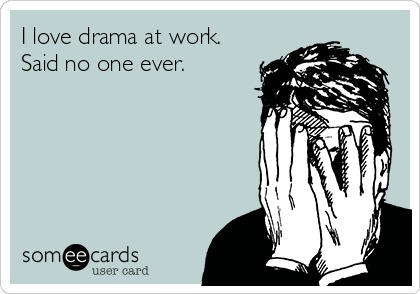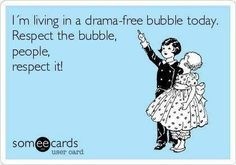Drama at work? Why does that happen?
And how can we avoid it?
We've all experienced drama at work, right? Why does that happen, and how can we change the culture and dynamic in our department?
In some cases, drama is stirred up because people aren't busy enough. Believe it or not, many people don't have consistent work crossing their desks, and they find ways to fill their time. I've sabotaged myself on more than one occasion, simply because I was bored with my work.
In more cases, drama is stirred up because people are uncomfortable with confrontation; people don't like to address issues face-to-face. Here are some tips for dealing with drama at work:

The Gossip/Back Stabber:
When someone is speaking badly about a colleague behind her back, say: "She was really helpful to me when..." or find a positive thing to say about the person. Another option is to say something directly: "That's not very nice, I'm guessing you didn't mean that the way it came out." Give the person a chance to back peddle.
If it's you that is being talked about, address it directly with the person you know is playing that game. Talk to the person one-to-one first, and if that doesn't work, document what's going on and present it to the person in the company of another colleague. "Do not talk about me and my personal business behind my back. It's unprofessional and makes others wonder if you're doing the same to them."
Here's why that works: When a gossiper realizes you aren't going to play along, and that you won't tolerate the behavior, he/she must rethink everything they share with you and others. When a person is directly confronted, they are likely to deny anything, but will reconsider sharing information like that in the future, if they know they're likely to be confronted.
The Constant Complainer:
This is the person who always has something negative to say to anyone who will listen. You have a few options for this kind of person, starting with a similar response to the gossip; redirection. Share positive remarks, compliment the person in some way, and redirect the conversation to one that's more upbeat and positive. When the person tries to bring the conversation back to their negative space, be persistent in changing the direction of the conversation. If this doesn't work, be direct with him/her: "I can't help you figure this out if you don't want to solve the problem."
Be direct and let the person know how he/she is coming across; it's best to be discrete and have this conversation one-to-one: "When you come talk to me, most of what you say is negative and cynical. It's hard for me to help solve problems and keep a positive attitude when you're like this. I know you have a lot going on, and when you need to vent sometimes, I'm here. I can't participate in a consistently negative conversation."
Here's why that works: The complainer often doesn't know that's how he/she is coming across. When you distract and redirect the conversation to something more positive, they'll react either by walking away, puzzled, or by trying to get you back into their negative space. Once you've established those boundaries, the complainer will have to consider coming to you, or anyone else, with a consistently negative attitude.
The Bossy One:
The bossy one takes control of meetings, even when he/she is not in a leadership role for your group. Sometimes this is someone you really like, but have trouble with because of the pushy dynamic that comes across in interactions. He/she has good intentions, and usually has no idea how they're coming across to others.
In these situations, it's really important to pull the person aside and let them know exactly what is happening and how it's making you feel. Make sure you're addressing the behavior, and not insulting the person when you confront him/her. "When you did that, it made me feel like you weren't listening, and that your ideas were the only ones that would be considered. You have great ideas, and we all want to hear them. I have some ideas and suggestions I know will improve things, too, and I didn't feel like I had any room to share them. Please listen more, and leave some space for others to contribute."
Here's why that works: When you address behavior, as opposed to saying "you're bossy" or "you're mean", you leave room for improvement. And when you respectfully address an issue in private, you're offering solutions, rather than complaining without any way to fix the problem.

When we confront bad behavior immediately, and back up others who confront it, we send a message that it won't be tolerated. But none of this works if we don't back up people who are confronting that behavior, and it won't work if you don't practice what to say and how to say it. Most of us freeze when we're faced with bad behavior and the potential for conflict; that's why it's so important to work with friends and family to role play those scenarios. Once you've practiced confrontation for a variety of scenarios, it's a lot more likely you'll implement these strategies.
""
Articles from Sarah Elkins
View blog
A Laundry List of "Wants" Leads to Arbitrary Boundaries and Limits Opportunities · My friend was tel ...

No Longer Virtual = True Engagement of Your Valuable Network · It all started with a call from Karth ...

I was on the phone with my mother when we were in our car on our way to the gym. · I would work out, ...
Related professionals
You may be interested in these jobs
-
Certified Registered Nurse Anesthetist
Found in: Talent US C2 - 5 days ago
Phoebe Putney Health System Albany, United States Full timeJOB SUMMARY · Under the medical direction of an Anesthesiologist and according to established procedures, professional standards and professional judgement, the CRNA administers intravenous, inhalation and other anesthetics during surgical procedures, deliveries and other medica ...
-

Dietitian (Facility Program Coordinator)
Found in: Talent US 2 C2 - 5 days ago
Veterans Health Administration Richmond, United StatesSummary · Dietitians in this assignment serve as a Facility Program Coordinator leading a multidisciplinary team. They are administratively responsible for a specialty program and provide program-specific leadership, guidance and direction, technical advice, and staff developmen ...
-
Construction Manager
Found in: Appcast Linkedin GBL C2 - 5 days ago
The Ash Group Indianapolis, United States**W2 ONLY, NO C2C or 3rd Parties** · Title: Construction Manager · Location: Indianapolis, IN · Setting: Onsite · Pay: $44.25/hr on W2 (Roughly $22/hr per diem and $22/hr pay) · Duration: 18-month contract, possible extension/conversion · Construction Manager Accountable for all ...



Comments
Samina Khan
2 years ago #16
I think one of the biggest problems with people at work is that they simply don't know how to chill out. I practice meditation daily. It is amazing how much more I get done because office politics and life's dramas don't get to me. I started a beBee group called Meditation and Mindfulness and just wrote a blog about how to meditate. Check it out!
Wayne Yoshida
6 years ago #15
Sarah Elkins - ah, dinner time ramblings. Brings back funny (sad and stressful at the time) memories. One time, I said to mom and dad -- "are you listening to what you are saying? You two are talking about two totally different things" -- I do not recall the argument, but it was funny things were not matching at all. Similar to too many movies about dysfunctional families. Not quite like Edith and Archie and Meathead and "Little Girl" - but close . . . .
Sarah Elkins
6 years ago #14
I've rarely had an ideal workplace experience, isn't that sad? But I've found an incredible online network here and on LI that are truly empowering me to find and use my voice more effectively. Perhaps the tide will turn as we keep sharing the kind, considerate, compassionate way to live?
Sarah Elkins
6 years ago #13
Workplace - and personal - drama definitely has profound impacts on our productivity, health, and well being, Proma \ud83d\udc1d Nautiyal?
Sarah Elkins
6 years ago #12
Such a sad state, Lisa \ud83d\udc1d Gallagher, and familiar. When it's a person in authority, the strategies are really different, and in most cases unfixable. I had a boss who loved to stir things up among employees, just so he could come through as the hero when he fixed things. I figured out he just needed to feel relevant, useful, and when I started making efforts to acknowledge his contributions, he mellowed a bit with the drama. I should add that personality to this list!
Sarah Elkins
6 years ago #11
That's awesome, Wayne Yoshida. I'll never forget the time when our older son was having a complete meltdown at the dinner table, he was 4, and my husband and I dramatically started our own melt-downs - in very loud, whining voices. He stopped almost immediately and looked from me to his dad, back and forth until we stopped. Then we all started laughing.
Sarah Elkins
6 years ago #10
There are definitely times, Lupita, when all you can do is walk away from it. In confronting those with dramatic tendencies, I find that about 1/2 don't know they're doing it, or have some idea, but don't know how to address it. I had a great conversation with one a while back, and luckily she knew me well enough to know I said this with love: "Oh please, __, don't you think that's just a little dramatic?" And then I walked her through what was dramatic about what she was sharing. It was terrific, and now I see her rethinking some of that behavior without losing that part of her sparkling, unique personality.
Sarah Elkins
6 years ago #9
You just brought back some unpleasant memories, Claire! We had to release a member of our band a couple of years ago for the same reason. It was sad because he's super talented, but I just couldn't tolerate the drama anymore. Lots of intensely creative people suffer from mental health issues, and drama always follows them around. Thanks for the comment!
Sarah Elkins
6 years ago #8
You know, Pascal Derrien, that's absolutely true. That's why I try to think in terms of behavior, rather than character. When we are compassionate, and recognize that there's an entire undercurrent in people's lives, we can address behavior without insulting people.
Sarah Elkins
6 years ago #7
I like Phil Friedman, particularly when I imagine slapping the person. ;-)
Sarah Elkins
6 years ago #6
I've found, Jim Cody \ud83d\udc1d Brand Ambassador, that you're right about drama bringing more drama. Once people realize I won't tolerate it, they generally leave me out of it. The only downside to that is I used to feel very left out - I worked in an office where a handful of the administrative would consistently ask me to cover phones so they could go to lunch together, and never invited me. At first I was a little sad, but then realized I wanted nothing to do with them anyway. I didn't make friends there! I also find that some people love the drama because it makes them feel relevant. I had a boss who would stir things up among staff, just so he could appear to be a mediator and hero when he "solved" the problem. Makes me crazy.
Sarah Elkins
6 years ago #5
I wish I could walk away from it Cyndi wilkins, and yes, associating these people with misbehaving children/toddlers is generally a good way to think about behavior modification. Thanks for the comment.
Sarah Elkins
6 years ago #4
Thanks for that idea, Phil Friedman, that makes a lot of sense! I've tried a few things that have worked, one was to lean forward, and speak very quietly so the person has to strain to hear my voice. I'd rather slap them sometimes, but that's frowned upon in the public sector... The other thing I've had experience with is to have a mirror behind your desk. People generally don't like how they look when they're angry, and when they catch sight of themselves, often slow down and reassess. Going to have to try the inadvertent loud noise idea, thanks again!
CityVP Manjit
6 years ago #3
Wayne Yoshida
6 years ago #2
Wayne Yoshida
6 years ago #1
I have seen that one in practice, years ago, in a staff meeting. The effect was astounding, since the person slamming his fist onto the table was usually a very quiet and calm manager. The entire room went silent. . . . and the meeting continued.